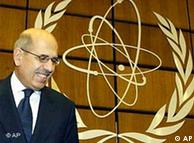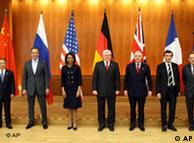Germany and France said Wednesday Iran's claim to have enriched uranium on its own was a step in the wrong direction. But they hope Iran will still adhere to a UN Security Council deadline.
Germany's deputy government spokesman Thomas Steg said Iran must suspend all uranium enrichment work, as stipulated in a UN Security Council resolution last month.
"We are deeply concerned about these reports of the supposedly successful start of enrichment activities," Steg told reporters on Wednesday.
"We can only say that this is a further step in the wrong direction. Iran is apparently not prepared to abandon the road to isolation," Steg said, echoing criticism from the United States and Russia.
The French government shared Germany's sentiments.
"These declarations are rather a step in the wrong direction," government spokesman Jean-Francois Cope said. He said France was aiming for a diplomatic settlement to the affair.
"We call on Iran to respect its obligations and comply with the demands of the International Atomic Energy Agency and the UN Security Council," Cope said.
Iran should re-establish a "relationship of trust"
 IAEA's Mohamed ElBaradei will be negotiating in Tehran this week
IAEA's Mohamed ElBaradei will be negotiating in Tehran this week
"The announcement by the Iranian authorities of the activation of 164 centrifuges is worrying," French Foreign Minister Philippe Douste-Blazy said in a statement. "If this announcement were confirmed, it would go directly against the repeated demands made by the IAEA and the United Nations Security Council."
The minister said France was awaiting the conclusions of a mission to Iran by IAEA head Mohamed ElBaradei, who leaves for Tehran Wednesday.
"Once again, I firmly urge Iran to suspend its dangerous activities in order to re-establish a relationship of trust with the international community," Douste-Blazy said.
Waiting for a "reliable signal"
Germany has been working with the five permanent members of the UN Security Council -- Britain, China, France, Russia and the United States -- to convince Tehran to freeze its enrichment program.
 Germany and the five permanent members of the UN Security Council are aiming for a peaceful solution
Germany and the five permanent members of the UN Security Council are aiming for a peaceful solution
German foreign ministry spokesman Martin Jäger said Wednesday the negotiations had reached a "difficult phase."
He said the partners were waiting for a "reliable signal" that Tehran was willing to meet the UN Security Council deadline to freeze its enrichment activities, which runs out this month.
Jäger added that Germany still believed that a Russian proposal to enrich uranium for Iran on Russian soil could be "an important element of a possible solution."
In an elaborate ceremony Tuesday, the Islamic regime declared its scientists had managed to enrich uranium to make reactor fuel, in direct contravention of the UN Security Council demand for such work to stop.
This process, which can be extended to make weapons-grade uranium, is the focus of fears that Iran could acquire weapons of mass destruction. Tehran has consistently denied the charge.

No comments:
Post a Comment